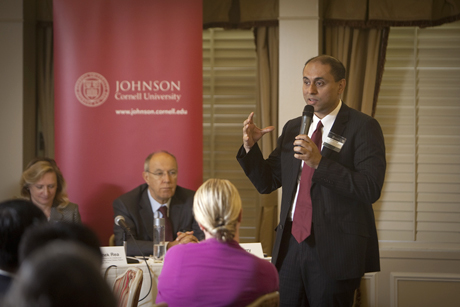Panel explores 'global game' of innovation
By Anne Ju

NEW YORK — The core ingredient in an ecosystem of innovation is talent – the human capital that brings the best ideas, creativity and invention to bear, according to Soumitra Dutta, the Anne and Elmer Lindseth Dean of the Samuel Curtis Johnson Graduate School of Management, who spoke at a July 8 panel discussion at the Cornell Club launching the 2013 Global Innovation Index (GII).
The availability of human capital is one of many factors used to calculate the GII, an annual ranking system that measures the pace of innovation in 142 countries. The report is published by the World Intellectual Property Organization (WIPO), a specialized agency of the United Nations; French business school INSEAD; and Cornell.
To celebrate its sixth launch, Dutta, founder and co-editor of the index, moderated a panel, introduced by President David Skorton, of university, industry and government experts. The GII’s official launch was held in Geneva, Switzerland, at the High-Level Segment of the United Nations Economic and Social Council, July 1-4, and was introduced by United Nations Secretary General Ban Ki-moon.
“Innovation today clearly has become a global game,” Dutta said. The index, topped by Switzerland and followed by Sweden, the United Kingdom, the Netherlands and the United States, comprises countries in Europe, Asia and the Middle East, Dutta continued.
The GII captures two elements of innovation – inputs and outputs – that determine the ability of an economy to innovate, and innovation performance results. Input factors are institutions, human capital and research, infrastructure, market sophistication and business sophistication. Outputs include traditional measures of knowledge and technology, as well as “creative outputs” such as creative goods and services and online creativity.
This year’s GII theme, “the local dynamics of innovation,” reflects the importance of local and regional hubs around universities, companies, specialized suppliers and service providers, according to the report.
An often-cited example of regional innovation is Cornell NYC Tech. Panelist and Cornell Tech Dean and vice provost Dan Huttenlocher described how the new campus is trailblazing such areas as speeding up the innovation pipeline as well as engaging with customers earlier in the creative process.
The index also compares peers’ performance by dividing results by income. What remains clear is a persistent “innovation divide” between rich and poor countries; innovation results still remain highly correlated with income levels.
Metrics have been refined over the years, Dutta said, to add more elements of quality, as opposed to quantitative factors. For example, this year’s index includes rankings of a country’s universities, the filing of patents in multiple countries, and the number of article citations.
Panelist Francis Gurry, director general of the World Intellectual Property Organization, said: “The reason why we have intellectual property is innovation. That is the purpose from which we go through the process of intellectual property, because it is the social and economic outcome we wish to achieve … innovation is a major component of economic growth.”
Panelist Teresa Stanek Rea, acting undersecretary of the U.S. Department of Commerce, expounded on the importance of a strong intellectual property system serving the common good in the United States and beyond.
The panel also included Robert Kahn, who spearheaded creation of the Internet and is now chairman, CEO and president of the Corporation for National Research Initiatives; he talked about the early days of the Internet and the innovative efforts that spurred it. And Barry Jaruzelski, senior partner at Booz & Co., brought an industry perspective to the discussion.
Besides economic and social well-being, there is a “very fundamental human reason why innovation is important,” Dutta said. “It is just simply a very key way to inspire young people … to create, to give voice to their own leadership and their own potential.”
The GII is supported by its corporate knowledge partners Booz & Co., the Confederation of Indian Industry, and telecommunications companies du and Huawei.
Media Contact
Get Cornell news delivered right to your inbox.
Subscribe